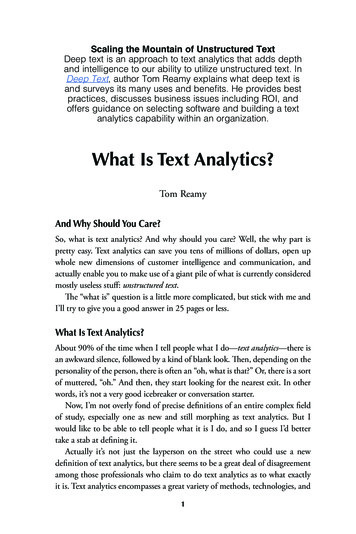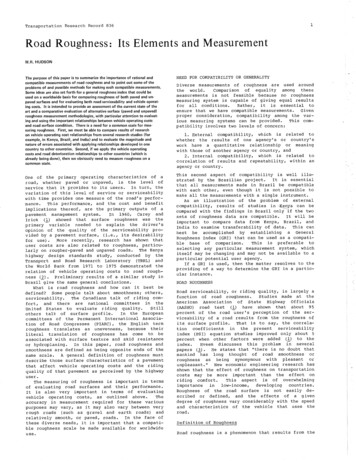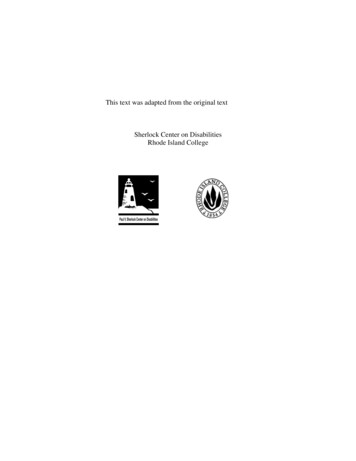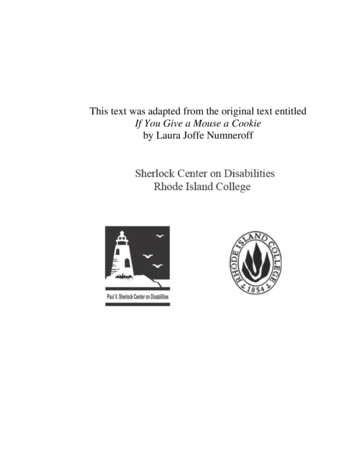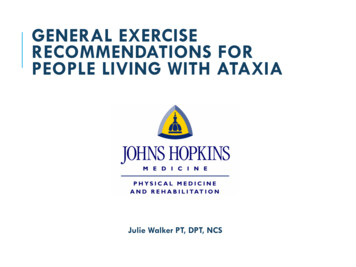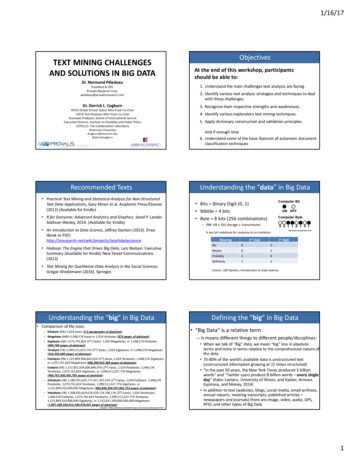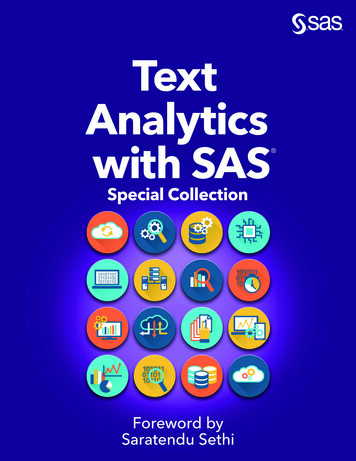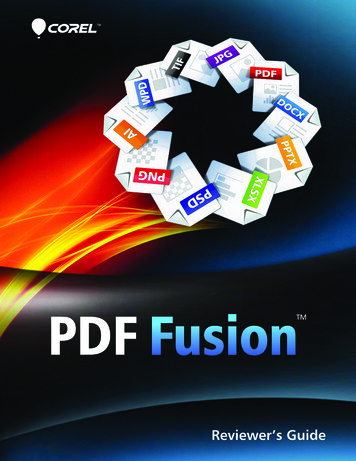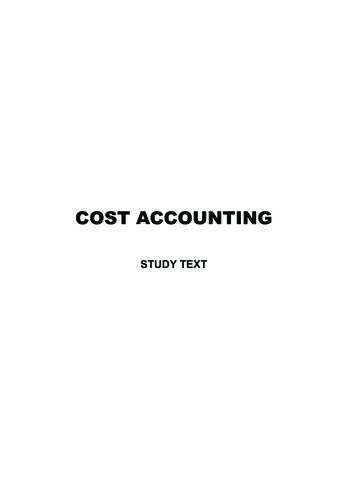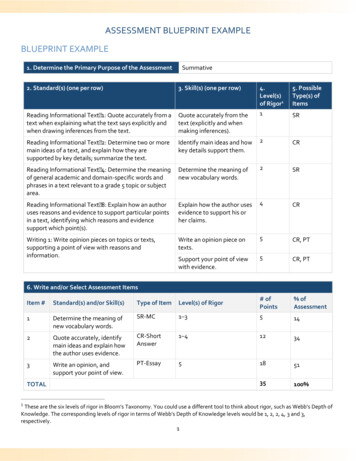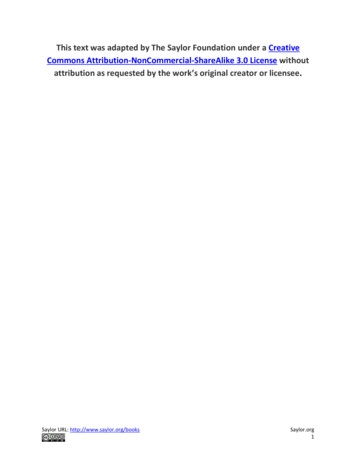
Transcription
This text was adapted by The Saylor Foundation under a CreativeCommons Attribution-NonCommercial-ShareAlike 3.0 License withoutattribution as requested by the work’s original creator or licensee.Saylor URL: http://www.saylor.org/booksSaylor.org1
PrefaceEthics is about determining value; it’s deciding what’s worth doing and what doesn’t matter so much.Business ethics is the way we decide what kind of career to pursue, what choices we make on the job,which companies we want to work with, and what kind of economic world we want to live in and thenleave behind for those coming after. There are no perfect answers to these questions, but there’s adifference between thinking them through and winging it. The Business Ethics Workshop provides aframework for identifying, analyzing, and resolving ethical dilemmas encountered through working life.This text’s principles: It’s your call. Some of the book’s case studies ask for defenses of ethical positions that few agree with(for example, the claim that a drug dealer’s job is better than a police officer’s). Exercises like this alignwith the textbook’s aim: provoking reasoning freed from customary divisions between right and wrong. Inthe end, no one completely resists their own habits of thinking or society’s broad pressures, but testing thelimits sharpens the tools of ethical analysis. These tools can be relied on later on when you face decisionsthat you alone have to make. The aim of this book is to help make those decisions with coherent,defensible reasoning. Keep it mostly real. Ethics is an everyday activity. It’s not mysterious, head-in-the-clouds ruminatingbut determining the worth of things around us: Working at an advertising agency is exciting—actors,lights, cameras, and TV commercials—but do I really want to hock sugary breakfast cereals to children?Should I risk my reputation by hiring my college roommate, the one who’s habits of showing up late anderratically to class have carried over to working life? These are the immediate questions of business ethics,and while any textbook on the subject must address broad, impersonal questions including theresponsibilities of massive corporations in modern societies, this book’s focus stays as often as possible onordinary people in normal but difficult circumstances. Be current. The rules of ethical thinking don’t change much, but the world is a constant revolution. Thetextbook and its cases follow along as closely as possible, citing from blog posts and recent news stories.As a note here, to facilitate reading some of these citations have been slightly and silently modified.Saylor URL: http://www.saylor.org/booksSaylor.org2
Let’s talk about our problem. Case studies are the most important components of this text because itwas written for a discussion-intensive class. Ethics isn’t something we know; it’s something we do, andtrying out our reasoning is the best way to confirm that it’s actually working.Saylor URL: http://www.saylor.org/booksSaylor.org3
Chapter 1What Is Business Ethics?Chapter OverviewChapter 1 "What Is Business Ethics?" defines business ethics and sketches how debates within the fieldhappen. The history of the discipline is also considered, along with the overlap between business andpersonal ethics.1.1 What Is Business Ethics?LEARNING OBJECTIVES1.Define the components of business ethics.2.Outline how business ethics works.Captive CustomersAnn Marie Wagoner studies at the University of Alabama (UA). She pays 1,200 a year for books, which isexasperating, but what really ticks her off is the text for her composition class. Called A Writer’s Reference(Custom Publication for the University of Alabama), it’s the same Writer’s Reference sold everywhereelse, with slight modifications: there are thirty-two extra pages describing the school’s particular writingprogram, the Alabama A is emblazoned on the front cover, there’s an extra 6 on the price tag (comparedwith the price of the standard version when purchased new), and there’s an added sentence on the back:“This book may not be bought or sold used.” The modifications are a collective budget wrecker. Becauseshe’s forced to buy a new copy of the customized Alabama text, she ends up paying about twice what she’dpay for a used copy of the standard, not-customized book that’s available at Chegg.com and similar usedbook dealers.For the extra money, Wagoner doesn’t get much—a few additional text pages and a school spirit cover.Worse, those extra pages are posted free on the English department’s website, so the cover’s the onlyunambiguous benefit. Even there, though, it’d be cheaper to just buy a UA bumper sticker and paste itSaylor URL: http://www.saylor.org/booksSaylor.org4
across the front. It’s hard to see, finally, any good reason for the University of Alabama EnglishDepartment to snare its own students with a textbook costing so much.Things clear up when you look closely at the six-dollar difference between the standard new book cost andthe customized UA version. Only half that money stays with the publisher to cover specialized printingcosts. The other part kicks back to the university’s writing program, the one requiring the book in the firstplace. It turns out there’s a quiet moneymaking scheme at work here: the English department gets somestraight revenue, and most students, busy with their lives, don’t notice the royalty details. They get theirbooks, roll their eyes at the cash register, and get on with things.Wagoner noticed, though. According to an extensive article in the Wall Street Journal, she calls the costof new custom books “ridiculous.” She’s also more than a little suspicious about why students aren’t moreopenly informed about the royalty arrangement: “They’re hiding it so there isn’t a huge uproar.”[1]While it may be true that the Tuscaloosa University is hiding what’s going on, they’re definitely not doinga very good job since the story ended up splattered across the Wall Street Journal. One reason the storyreached one of the United States’ largest circulation dailies is that a lot of universities are starting to get inon the cash. Printing textbooks within the kickback model is, according to the article, the fastest growingslice of the 3.5 billion college textbook market.The money’s there, but not everyone is eager to grab it. James Koch, an economist and former presidentof Old Dominion University and the University of Montana, advises schools to think carefully beforetapping into customized-textbook dollars because, he says, the whole idea “treads right on the edge ofwhat I would call unethical behavior. I’m not sure it passes the smell test.”[2]What Is Business Ethics?What does it mean to say a business practice doesn’t “pass the smell test”? And what would happen ifsomeone read the article and said, “Well, to me it smells all right”? If no substance fills out the idea, ifthere’s no elaboration, then there probably wouldn’t be much more to say. The two would agree todisagree and move on. Normally, that’s OK; no one has time to debate everything. But if you want to getinvolved—if you’re like Wagoner who sounds angry about what’s going on and maybe wants to change it—you’ll need to do more than make comments about how things hit the nose.Saylor URL: http://www.saylor.org/booksSaylor.org5
Doing business ethics means providing reasons for how things ought to be in the economic world. Thisrequires the following: Arranging values to guide decisions. There needs to be a clearly defined and well-justified set ofpriorities about what’s worth seeking and protecting and what other things we’re willing to compromise orgive up. For example, what’s more important and valuable: consumers (in this case students paying for aneducation) getting their books cheaply or protecting the right of the university to run the business side ofits operation as it sees fit? Understanding the facts. To effectively apply a set of values to any situation, the situation itself must becarefully defined. Who, for example, is involved in the textbook conflict? Students, clearly, as well asuniversity administrators. What about parents who frequently subsidize their college children? Are theyparticipants or just spectators? What about those childless men and women in Alabama whose taxes go tothe university? Are they involved? And how much money are we talking about? Where does it go? Why?How and when did all this get started? Constructing arguments. This shows how, given the facts, one action serves our values better than otheractions. While the complexities of real life frequently disallow absolute proofs, there remains an absoluterequirement of comprehensible reasoning. Arguments need to make sense to outside observers. In simple,practical terms, the test of an ethical argument resembles the test of a recipe for a cook: others need to beable to follow it and come to the same result. There may remain disagreements about facts and values atthe end of an argument in ethics, but others need to understand the reasoning marking each step taken onthe way to your conclusion.Finally, the last word in ethics is a determination about right and wrong. This actual result, however, issecondary to the process: the verdict is only the remainder of forming and debating arguments. That’swhy doing ethics isn’t brainwashing. Conclusions are only taken seriously if composed from clear values,recognized facts, and solid arguments.Saylor URL: http://www.saylor.org/booksSaylor.org6
Bringing Ethics to Kickback TextbooksThe Wall Street Journal article on textbooks and kickbacks to the university is a mix of facts, values, andarguments. They can be sorted out; an opportunity to do the sorting is provided by one of the article’smore direct assertions:Royalty arrangements involving specially made books may violate colleges’ conflict-of-interestrules because they appear to benefit universities more than students.A conflict of interest occurs when a university pledges to serve the interest of students but finds that itsown interest is served by not doing that. It doesn’t sound like this is a good thing (in the language of thearticle, it smells bad). But to reach that conclusion in ethical terms, the specific values, facts, andarguments surrounding this conflict need to be defined.Start with the values. The priorities and convictions underneath the conflict-of-interest accusation areclear. When university takes tuition money from a student and promises to do the best job possible inproviding an education to the student, then it better do that. The truth matters. When you make apromise, you’ve got to fulfill it. Now, this fundamental value is what makes a conflict of interestworrisome. If we didn’t care about the truth at all, then a university promising one thing and doingsomething else wouldn’t seem objectionable. In the world of poker, for example, when a player makes agrand show of holding a strong hand by betting a pile of chips, no one calls him a liar when it’s laterrevealed that the hand was weak. The truth isn’t expected in poker, and bluffing is perfectly acceptable.Universities aren’t poker tables, though. Many students come to school expecting honesty from theirinstitution and fidelity to agreements. To the extent these values are applied, a conflict of interest becomesboth possible and objectionable.With the core value of honesty established, what are the facts? The “who’s involved?” question brings inthe students buying the textbooks, the company making the textbooks (Bedford/St. Martin’s in Boston),and the University of Alabama. As drawn from the UA web page, here’s the school’s purpose, the reason itexists in the first place: “The University of Alabama is a student-centered research university and anacademic community united in its commitment to enhancing the quality of life for all Alabamians.”Moving to the financial side, specific dollar amounts should be listed (the textbook’s cost, the cost for thenon-customized version). Also, it may be important to note the financial context of those involved: in theSaylor URL: http://www.saylor.org/booksSaylor.org7
case of the students, some are comfortably wealthy or have parents paying for everything, while otherslive closer to their bank accounts edge and are working their way through school.Finally, the actual book-selling operation should be clearly described. In essence, what’s going on is thatthe UA English Department is making a deal with the Bedford/St. Martin’s textbook company. Theuniversity proposes, “If you give us a cut of the money you make selling textbooks, we’ll let you makemore money off our students.” Because the textbooks are customized, the price goes up while the supplyof cheap used copies (that usually can be purchased through the Internet from stores across the nation)goes way down. It’s much harder for UA students to find used copies, forcing many to buy a new version.This is a huge windfall for Bedford/St. Martin’s because, for them, every time a textbook is resold used,they lose a sale. On the other side, students end up shelling out the maximum money for each bookbecause they have to buy new instead of just recycling someone else’s from the previous year. Finally, atthe end of the line there is the enabler of this operation, the English department that both requires thebook for a class and has the book customized to reduce used-copy sales. They get a small percentage ofBedford/St. Martin’s extra revenue.With values and facts established, an argument against kickback textbooks at Alabama can be drawn up.By customizing texts and making them mandatory, UA is forcing students to pay extra money to take aclass: they have to spend about thirty dollars extra, which is the difference between the cost of a new,customized textbook and the standard version purchased, used. Students generally don’t have a lot ofmoney, and while some pass through school on the parental scholarship, others scrape by and have towork a Mc Job to make ends meet. So for at least some students, that thirty dollars directly equals timethat could be spent studying, but that instead goes to flipping burgers. The customized textbooks,consequently, hurt these students’ academic learning in a measurable way. Against that reality there’s theuniversity’s own claim to be a “student-centered” institution. Those words appear untrue, however, if theuniversity is dragging its own students out of the library and forcing them to work extra hours. To complywith its own stated ideals—to serve the students’ interests—UA should suspend the kickback textbookpractice. It’s important to do that, finally, because fulfilling promises is valuable; it’s something worthdoing.Saylor URL: http://www.saylor.org/booksSaylor.org8
Argument and CounterargumentThe conclusion that kickback textbooks turn universities into liars doesn’t end debate on the question. Infact, because well-developed ethical positions expose their reasoning so openly (as opposed to “it doesn’tsmell right”), they tend to invite responses. One characteristic, in other words, of good ethical argumentsis that, paradoxically but not contradictorily, they tend to provoke counterarguments.Broadly, there are three ways to dispute an argument in ethics. You can attack the1.facts,2. values,3. reasoning,In the textbook case, disputing the facts might involve showing that students who need to work a fewextra hours to afford their books don’t subtract that time from their studying; actually, they subtract itfrom late-night hours pounding beers in dank campus bars. The academic damage done, therefore, bykickback textbooks is zero. Pressing this further, if it’s true that increased textbook prices translate intoless student partying, the case could probably be made that the university actually serves students’interests—at least those who drink too much beer—by jacking up the prices.The values supporting an argument about kickback textbooks may, like the facts, be disputed. VirginiaTech, for example, runs a text-customization program like Alabama’s. According to Tech’s EnglishDepartment chair Carolyn Rude, the customized books published by Pearson net the department about 20,000 a year. Some of that cash goes to pay for instructors’ travel stipends. These aren’t luxury retreatsto Las Vegas or Miami; they’re gatherings of earnest professors in dull places for discussions that reliablyput a few listeners to sleep. When instructors—who are frequently graduate students—attend, they’relooking to burnish their curriculum vitae and get some public responses to their work. Possibly, the tripwill help them get a better academic job later on. Regardless, it won’t do much for the undergraduates atVirginia Tech. In essence, the undergrads are being asked to pay a bit extra for books to help graduatestudents hone their ideas and advance professionally.Can that tradeoff be justified? With the right values, yes. It must be conceded that Virginia Tech isprobably rupturing a commitment to serve the undergrads’ interest. Therefore, it’s true that a certainSaylor URL: http://www.saylor.org/booksSaylor.org9
amount of dishonesty shadows the process of inflating textbook costs. If, however, there’s a higher valuethan truth, that won’t matter so much. Take this possibility: what’s right and wrong isn’t determined byhonesty and fidelity to commitments, but the general welfare. The argument here is that while it’s truethat undergrads suffer a bit because they pay extra, the instructors receiving the travel stipends benefit alot. Their knowledge grows, their career prospects improve, and in sum, they benefit so much that itentirely outweighs the harm done to the undergrads. As long as this value—the greatest total good—frames the assessment of kickback textbooks, the way is clear for Tech or Alabama to continue thepractice. It’s even recommendable.The final ground on which an ethical argument can be refuted is the reasoning. Here, the facts areaccepted, as well as the value that universities are duty bound to serve the interests of the tuition-payingundergraduate students since that’s the commitment they make on their web pages. What can still bedebated, however, is the extent to which those students may actually be benefitted by customizingtextbooks. Looking at the Wall Street Journal article, several partially developed arguments are presentedon this front. For example, at Alabama, part of the money collected from the customized texts underwritesteaching awards, and that, presumably, motivates instructors to perform better in the classroom, whichends up serving the students’ educational interests. Similarly, at Virginia Tech, part of the revenue isapportioned to bring in guest speakers, which should advance the undergraduate educational cause. Thebroader argument is that while it’s true that the students are paying more for their books than peers atother universities, the sequence of reasoning doesn’t necessarily lead from that fact to the conclusion thatthere’s a reproachable conflict of interest. It can also reach the verdict that students’ educationalexperience is improved; instead of a conflict of interest, there’s an elevated commitment to studentwelfare inherent in the kickback practice.Conclusion. There’s no irrefutable answer to the question about whether universities ought to get involvedin kickback textbooks. What is clear, however, is that there’s a difference between responding to them byasserting that something doesn’t smell right, and responding by uniting facts, values, and reasoning toproduce a substantial ethical argument.KEY TAKEAWAYS Business ethics deals with values, facts, and arguments.Saylor URL: http://www.saylor.org/booksSaylor.org10
Well-reasoned arguments, by reason of their clarity, invite counterarguments.REVIEW QUESTIONS1.What is the difference between brainwashing and an argument?2.What does it mean to dispute an argument on the basis of the facts?3.What does it mean to dispute an argument on the basis of the values?4.What does it mean to dispute an argument on the basis of the reasoning?[1] John Hechinger, “As Textbooks Go ‘Custom,’ Students Pay: Colleges Receive Royalties for School-SpecificEditions; Barrier to Secondhand Sales,” Wall Street Journal, July 10, 2008, accessed May 85141235.html.[2] John Hechinger, “As Textbooks Go ‘Custom,’ Students Pay: Colleges Receive Royalties for School-SpecificEditions; Barrier to Secondhand Sales,” Wall Street Journal, July 10, 2008, accessed May 85141235.html.Saylor URL: http://www.saylor.org/booksSaylor.org11
1.2 The Place of Business EthicsLEARNING OBJECTIVES1.Distinguish the place of business ethics within the larger field of decision making.2.Sketch the historical development of business ethics as a coherent discipline.The Boundaries and History of Business EthicsThough both economic life and ethics are as old as history, business ethics as a formal area of study isrelatively new. Delineating the specific place of today’s business ethics involves distinguishing morality, ethics, and meta-ethics; dividing normative from descriptive ethics; comparing ethics against other forms of decision making; sketching some inflection points in the histories of ethics and business ethics.Morality, Ethics, and Meta-ethics: What’s the Difference?The back and forth of debates about kickback textbooks occurs on one of the three distinct levels ofconsideration about right and wrong. Morals occupy the lowest level; they’re the direct rules we ought tofollow. Two of the most common moral dictates are don’t lie and don’t steal. Generally, the question to askabout a moral directive is whether it was obeyed. Specifically in the case of university textbooks, thedebate about whether customized textbooks are a good idea isn’t morality. It’s not because moralitydoesn’t involve debates. Morality only involves specific guidelines that should be followed; it only beginsSaylor URL: http://www.saylor.org/booksSaylor.org12
when someone walks into a school bookstore, locates a book needed for a class, strips out the littlemagnetic tag hidden in the spine, and heads for the exit.Above all morality there’s the broader question about exactly what specific rules should be instituted andfollowed. Answering this question is ethics. Ethics is the morality factory, the production of guidelinesthat later may be obeyed or violated. It’s not clear today, for example, whether there should be moral ruleprohibiting kickback textbooks. There are good arguments for the prohibition (universities are betrayingtheir duty to serve students’ interests) and good arguments against (schools are finding innovative sourcesof revenue that can be put to good use). For that reason, it’s perfectly legitimate for someone like AnnMarie Wagoner to stand up at the University of Alabama and decry the practice as wrong. But she’d begoing too far if she accused university administrators of being thieves or immoral. They’re not; they’re onthe other side of an ethical conflict, not a moral one.Above both morality and ethics there are debates about meta-ethics. These are the most abstract andtheoretical discussions surrounding right and wrong. The questions asked on this level include thefollowing: Where do ethics come from? Why do we have ethical and moral categories in the first place? Towhom do the rules apply? Babies, for example, steal from each other all the time and no one accuses themof being immoral or insufficiently ethical. Why is that? Or putting the same question in the longer termsof human history, at some point somewhere in the past someone must have had a light bulb turn on intheir mind and asked, “Wait, is stealing wrong?” How and why, those interested in meta-ethics ask, didthat happen? Some believe that morality is transcendent in nature—that the rules of right and wrongcome from beyond you and me and that our only job is to receive, learn, and obey them. Divine commandtheory, for example, understands earthly morality as a reflection of God. Others postulate that ethics isvery human and social in nature—that it’s something we invented to help us live together in communities.Others believe there’s something deeply personal in it. When I look at another individual I see in thedepth of their difference from myself a requirement to respect that other person and his or heruniqueness, and from there, ethics and morality unwind. These kinds of meta-ethical questions, finally,are customarily studied in philosophy departments.Conclusion. Morality is the rules, ethics is the making of rules, and meta-ethics concerns the origin of theentire discussion. In common conversation, the words morality and ethics often overlap. It’s hard tochange the way people talk and, in a practical field like business ethics, fostering the skill of debatingSaylor URL: http://www.saylor.org/booksSaylor.org13
arguments is more important than being a stickler for words, but it’s always possible to keep in mind that,strictly speaking, morality and ethics hold distinct meanings.What’s the Difference between Normative Ethics and Descriptive Ethics?Business ethics is normative, which means it concerns how people ought to act. Descriptive ethics depictshow people actually are acting.At the University of Alabama, Virginia Tech, and anywhere kickback textbooks are being sold, there areprobably a few students who check their bank accounts, find that the number is low, and decide to mounttheir own kickback scheme: refund the entire textbook cost to themselves by sneaking a copy out of thestore. Trying to make a decision about whether that’s justified—does economic necessity license theft insome cases?—is normative ethics. By contrast, investigating to determine the exact number of studentswalking out with free books is descriptive. So too is tallying the reasons for the theft: How many stealbecause they don’t have the money to pay? How many accuse the university of acting dishonestly in thefirst place and say that licenses theft? How many question the entire idea of private property?The fields of descriptive ethics are many and varied. Historians trace the way penalties imposed for thefthave changed over time. Anthropologists look at the way different cultures respond to thievery.Sociologists study the way publications, including Abbie Hoffman’s incendiary book titled Steal ThisBook, have changed public attitudes about the ethics of theft. Psychologists are curious about thesubconscious forces motivating criminals. Economists ask whether there’s a correlation betweenindividual wealth and the kind of moral rules subscribed to. None of this depends on the question aboutwhether stealing may actually be justifiable, but all of it depends on stealing actually happening.Ethics versus Other Forms of DecisionWhen students stand in the bookstore flipping through the pages of a budget buster, it’s going to cross afew minds to stick it in the backpack and do a runner. Should they? Clear-headed ethical reflection mayprovide an answer to the question, but that’s not the only way we make decisions in the world. Even in theface of screaming ethical issues, it’s perfectly possible and frequently reasonable to make choices based onother factors. They include: The lawSaylor URL: http://www.saylor.org/booksSaylor.org14
Prudence (practicality) Religion Authority figures Peer pressure Custom ConscienceWhen the temptation is there, one way to decide whether to steal a book is legal: if the law says I can’t, Iwon’t. Frequently, legal prohibitions overlap with commonly accepted moral rules: few legislators want tosponsor laws that most believe to be unjust. Still, there are unjust laws. Think of downloading a text (ormusic, or a video) from the web. One day the downloading may be perfectly legal and the next, after a billis passed by a legislature, it’s illegal. So the law reverses, but there’s no reason to think the ethics—thevalues and arguments guiding decisions about downloading—changed in that short time. If the ethicsdidn’t change, at least one of the two laws must be ethically wrong. That means any necessary connectionbetween ethics and the law is broken. Even so, there are clear advantages to making decisions based onthe law. Besides the obvious one that it’ll keep you out of jail, legal rules are frequently cleaner and moredirect than ethical determinations, and that clarity may provide justification for approving (ordisapproving) actions with legal dictates instead of ethical ones. The reality remains, however, that thetwo ways of deciding are as distinct as their mechanisms of determination. The law results from the votesof legislators, the interpretations of judges, and the understanding of a policeman on the scene. Ethicalconclusions result from applied values and arguments.Religion may also provide a solution to the question about textbook theft. The Ten Commandments, forexample, provide clear guidance. Like the law, most mainstream religious dictates overlap with generallyaccepted ethical views, but that doesn’t change the fact that the rules of religion trace back to beliefs andfaith, while ethics goes back to arguments.Prudence, in the sense of practical concern for your own well-being, may also weigh in and finally guide adecision. With respect to stealing, regardless of what you may believe about ethics or law or religion, thepossibility of going to jail strongly motivates most people to pay for what they carry out of stores. If that’sthe motivation determining what’s done, then personal comfort and welfare are guiding the decision morethan sweeping ethical arguments.Saylor URL: http://www.saylor.org/booksSaylor.org15
Authority figures may be relied on to make decisions: instead of asking whether it’s right to steal a book,someone may ask themselves, “What would my parents say I should do? Or the soccer coach? Or a movies
Royalty arrangements involving specially made books may violate colleges' conflict-of-interest rules because they appear to benefit universities more than students. A conflict of interest occurs when a university pledges to serve the interest of students but finds that its own interest is served by not doing that. It doesn't sound like this .

